
– 2 -8-2020 –
Eighteenth Sunday in Ordinary Time
Like the manna in the desert, bread in plenty for the crowds is seen as a sign of the coming of the kingdom and of the heavenly banquet in the end times. The actions of Jesus in the desert are described in the same way as his actions at the Last Supper: he takes, blesses, breaks and gives.
Gospel text : Matt 14:13-21
vs.13 When Jesus received the news of John the Baptist’s death he withdrew by boat to a lonely place where they could be by themselves.
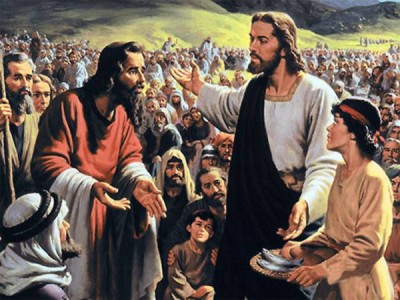 vs.14 But the people heard of this and, leaving the towns, went after him on foot. So as he stepped ashore he saw a large crowd, and he took pity on them and healed their sick.
vs.14 But the people heard of this and, leaving the towns, went after him on foot. So as he stepped ashore he saw a large crowd, and he took pity on them and healed their sick.
vs.15 When evening came, the disciples went to him and said, “This is a lonely place, and the time has slipped by; so send the people away, and they can go to the villages to buy themselves some food.”
vs.16 Jesus replied, “There is no need for them to go: give them something to eat yourselves.”
vs.17 But they answered, “All we have with us is five loaves and two fish.”
vs.18 “Bring them here to me” he said.
vs.19 He gave orders that the people were to sit down on the grass; then he took the five loaves and the two fish, raised his eyes to heaven and said the blessing. And breaking the loaves he handed them to his disciples who gave them to the crowds.
vs.20 They all ate as much as they wanted, and they collected the scraps remaining, twelve baskets full.
vs.21 Those who ate numbered about five thousand men, to say nothing of women and children.
****************************************************************
We have four sets of homily notes to choose from. Please scroll down the page for the desired one.
Michel DeVerteuil A Trinidadian Holy Ghost Priest, Specialist in Lectio Divina
Thomas O’Loughlin: Professor of Historical Theology, University of Nottingham
John Littleton: Director of the Priory Institute Distant Learning, Tallaght, Dublin 24
Donal Neary SJ Editor of The Sacred Heart Messenger,
****************************************
Michel DeVerteuil
Lectio Divina with the Sunday Gospels- Year A
www.columba.ie
General and Textual Comments
This Sunday’s passage is in two sections:
– Verses 13 and 14 tell a story which typifies Jesus’ ministry. We can read it from two perspectives:
a) Jesus as experienced by the people. He was the kind of leader people feel drawn to; they “go after him” even if they have to go “on foot” and even when he and his disciples are saddened by bad news and “withdraw by boat to a lonely place where they can be by themselves”.
b) Jesus as he is in himself:
– sensitive so that when he hears that a great man has been martyred, he feels the need to withdraw to a lonely place;
– selfless so that even in a time of personal distress he finds the resources to reach out to those in need; he lets them bring out the best in himself.
The story invites us to celebrate leaders like Jesus. It also calls us to repentance so that we can be more like him, as 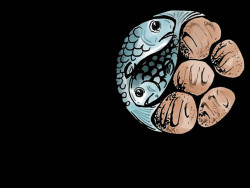 individuals and as a Church. – The story of Jesus’ miraculous feeding (verses 15 to 21) is unique in that it is told five times in the gospels – twice in St Matthew (here and in 15:32-38) and once in each of the other gospels. Clearly, the early Christians considered the incident crucial for understanding the person and ministry of Jesus. Each of the five accounts has details which are special to it and bring out its particular emphases. We take the account before us as the Word of God addressed to us here and now; we don’t refer to the other accounts.
individuals and as a Church. – The story of Jesus’ miraculous feeding (verses 15 to 21) is unique in that it is told five times in the gospels – twice in St Matthew (here and in 15:32-38) and once in each of the other gospels. Clearly, the early Christians considered the incident crucial for understanding the person and ministry of Jesus. Each of the five accounts has details which are special to it and bring out its particular emphases. We take the account before us as the Word of God addressed to us here and now; we don’t refer to the other accounts.
We can read the story as a teaching on the Eucharist (and this is how it is often read in the church) but it is better to read it in a wider sense, as a general teaching on Jesus’ mission in the world. Reading the story in this way reminds us that the Eucharist is itself a living lesson (“sacrament”) of Jesus’ mission – and ours too. This is a point I developed in my booklet, The Eucharist as Word (published in 2001 by Veritas).
It is significant that the story does not lay emphasis on the the miracle itself but on the gestures which precede and follow it – another indication that the miracle of the feeding is a “sign”, a lesson about life that we are called to celebrate and imitate. Being followers of Jesus does not mean having to “work miracles” as he did. Though we may occasionally do extraordinary things, we must always see them as exceptional. What we are called to do always is to adopt his attitudes, expressed by his gestures in today’s story.
We can identify three stages in the story.
– A preliminary stage in verses 15 to 17. These verses present a striking contrast between Jesus’ approach and that of his disciples:
– the disciples want Jesus to “send the people away”; he says, “give them something to eat yourselves”;
– they speak disparagingly of their situation, “all we have is five loaves and two fish”; he welcomes what they have – “bring them here to me”.
As always, we are invited to recognise that we have lived both stories. Jesus is our story of grace which we celebrate; the disciples are our story of sin for which we repent.
– The miracle itself in verses 18 and 19. Here the focus is on Jesus alone:
– he orders the people to sit down on the grass; he is in control and does things in an orderly way;
– he takes the five loaves and two fish, raises his eyes to heaven and says the blessing; he is humble and reverent in the presence of the Giver of all gifts;
– he breaks the loaves and hands them to his disciples who give them to the crowd; he shares the food and shares his authority.
– The fruit of the miracle in verse 20. Two points are made, applicable both to the Eucharist and to Jesus’ entire mission:
– “They ate as much as they wanted” reminds us that the Eucharist “contains in itself all sweetness,”
according to an ancient antiphon; it also reminds us that in “Jesus communities” the needs of all are looked after.
– “They collected the scraps remaining, twelve baskets full” brings out two points:
– the food is abundant, true of the Eucharist and of Jesus’ ministry in general;
– the people receive it with reverence, also true of the Eucharist (the church has seen the veneration of the Real Presence as the fulfillment of this text) and of Jesus’ ministry. In “Jesus communities” people appreciate what they receive, and do not waste it (contrast with the fast food industry).
Prayer Reflections
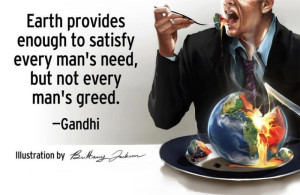 Lord, the reason why there is not sufficient food in the world today
Lord, the reason why there is not sufficient food in the world today
is that people are not concerned for one another.
When the prosperous see others in need they respond like the disciples.
They want to send them away and tell them to go to the villages
to buy themselves some food,
although they know perfectly well that in fact
there is nothing in the villages for them to buy.
Send us leaders like Jesus
who will tell us that there is no need for the crowds to go away,
since we can give them something to eat ourselves.
Even if all we have with us is five loaves and two fish, we can bring them to you
and raise our eyes to heaven in thanksgiving for what we have.
All will eat as much as they want,
and in fact there will be basketfuls of scraps remaining.
Lord, we thank you for our (Caribbean) housewives.
When visitors come to their homes and evening comes,
they don’t send them away to buy themselves some food.
They tell their children, “Let us give them something to eat ourselves.”
They take whatever five loaves and two fish they have,
raise their eyes to heaven and say the blessing,
and then share with their guests.
A strange thing happens – all eat as much as they want.
But these women don’t waste anything;
they carefully collect whatever scraps remain.
Lord, we pastors tend to look on our ministry as an eight-to-four job.
When we have ministered to people and healed their sick we feel we have done enough.
Like the disciples of Jesus, when evening comes we want to dismiss them.
Teach us rather to be like him, to let the people stay with us,
and to share what we have with them.
“Development is the capacity of a society to tap the roots of popular creativity,
to free and empower people to exercise their intelligence and collective wisdom.” … Kari Leavitt, Canadian economist
Lord, we pray for those who work in community development,
especially in Third World countries.
Often, when they find that a community lacks something,
their first thought is to send the people to get it elsewhere.
Teach them to be like Jesus, to say to local leaders, “Bring what you have here to me,”
 to thank you for what they bring,
to thank you for what they bring,
and then hand it back to the leaders to give to the crowds,
trusting that all will have as much as they want.
Lord, we thank you for the Eucharist,
for the many times we were in a lonely place,
and your priest took bread, raised his eyes to heaven, said the prayer of blessing,
then he broke the bread and gave it to us,
so that we ate as much as we wanted.
*****************************************************
Thomas O’Loughlin
Liturgical Resources for the Year of Matthew
www.columba.ie
Introduction to the Celebration
Today we recall one of the great miracles of Jesus: a large group came to hear him and he saw their need and fed them with five loaves and two fish. We might look back and think that that is just a story, yet here we are today being fed by him at his table. We might look back and think that things like that do not happen, yet here are we who still look to him for the bread of life to give us strength and hope in our lives. We might look back and think of the miracles as just fables, yet we too gather today to listen to his teaching as the word of life.
Homily Notes
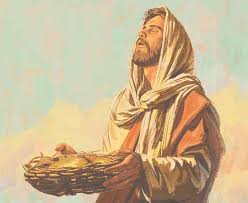 1. Miracles cause embarrassment within our world. The miraculous is suspected as fraud or foolishness; those who accept them as the gullible. Indeed, the whole study of the scriptures has been linked with the case for or against miracles: can one accept the teaching of the scriptures, yet leave this whole miraculous dimension parked somewhere either out of sight or somewhere it will not provoke questions such as ‘Do you think that actually happened?’ The problem is that so long as we read the primary stories of the tradition, we will encounter miracle stories like this one. So how do we react?
1. Miracles cause embarrassment within our world. The miraculous is suspected as fraud or foolishness; those who accept them as the gullible. Indeed, the whole study of the scriptures has been linked with the case for or against miracles: can one accept the teaching of the scriptures, yet leave this whole miraculous dimension parked somewhere either out of sight or somewhere it will not provoke questions such as ‘Do you think that actually happened?’ The problem is that so long as we read the primary stories of the tradition, we will encounter miracle stories like this one. So how do we react?
2. First, we must be honest about our own discomfort with such questions. Many people who grow up within the faith, when they begin to question, hear us refer to these miracles (without noting our discomfort or even admitting how they are not harmonious with our sense of rationality) just abandon belief on the secularist assumption that miracles are the province of the simple-minded and such ‘beliefs’ are endemic to religion, so the whole should be abandoned as a fairy tale. For anyone today, such stories as are found in today’s gospel should raise eyebrows.
3. Why do we find miracle stories a problem anyway? Most people in our society use a very simple model of what constitutes ‘truth.’ Truth is no more and no less than what can be observed by the senses directly. This model of truth has replaced the classical, medieval, renaissance, and now even the Marxist ways of viewing reality. This is not expressed by the average person as they go about the shopping in terms of a theory of verification; it is expressed far more concretely with something like: ‘Well if I were there on that lakeside with Jesus what would I have seen? Would I have been able to video it if there were videos?’ If the answer is no, then it is ‘just a story’ (and we know that when something is just a story, then it is lies). If truth is just what you can video, then meaning, values, belonging (at the lower level), justice,
Here we have the mystery of our own gathering: it is no ordinary feeding, no ordinary meal. It is with Jesus we have gathered, not just us but communities in literally thousands upon thousands of gatherings at the same time. Yet all are hearing the same Jesus, and being taught by him, and are with him as he offers the prayer of thanksgiving to the Father – just look at the words we will use with regard to our bread: ‘Blessed are you Lord, God of all creation … ‘ – and all of us are going to eat the loaf broken by him.
If we realise we have to expand our minds to take in the meaning of the miracle in today’s gospel, we will see that we have to expand our minds in just the same way to take in the mystery we are celebrating in our gathering today beauty and love (at a higher level), and the mystery of God interacting with us (at the highest level) are all just stories.
4. Whenever we encounter their more precious aspects of life we know that they are more than we can see or touch or taste, yet we only meet them amidst the fractured moments of daily existence. So to bring out the significant within the everyday our memory extracts, combines, and presents the meaning in restructured historical narrative. We all know this in our everyday lives when we try to make sense of experience by highlighting, dramatising, and exaggerating some aspects of the past so that the structure of meaning stands out. Here lies the role of the miracle story for it is the memory, here that of the community, restructuring events to bring out meaning. Nowhere is this gift more needed than in seeking to speak of the mysteries of God, and for us whose faith is founded in the Word made flesh this means that we express the totality of our beliefs about Jesus in stories anchored (on the one hand) in times and places, yet (on the other hand) greater in their dimensions than the scope of normal space and time. Such memories, elucidating the mystery of the Son of God who is the man Jesus, are our miracle stories. We need stories bigger than what our videos can record for mysteries bigger than our physical senses.
5. So what aspect of the mystery of the presence of the Word made flesh are Matthew, the churches who heard him, the later churches that read him down to this assembly today, remembering in the miracle of the feeding of the 5000 men? This is the genuine question we are called to reflect on and believe, not the question of the video camera.
 6. Just look at what the scene involves. We have a people gathered. They are listening to Jesus and being taught by him. We have people wanting food. We have loaves. We have Jesus blessing the Father (i.e. he offers a prayer of thanksgiving to the Father for the gift of the food; and note that he blesses God, not the loaves). Then Jesus breaks the loaves. And from a few loaves a whole multitude was able to eat as much as they wanted.
6. Just look at what the scene involves. We have a people gathered. They are listening to Jesus and being taught by him. We have people wanting food. We have loaves. We have Jesus blessing the Father (i.e. he offers a prayer of thanksgiving to the Father for the gift of the food; and note that he blesses God, not the loaves). Then Jesus breaks the loaves. And from a few loaves a whole multitude was able to eat as much as they wanted.
7. Here we have the mystery of our own gathering: it is no ordinary feeding, no ordinary meal. It is with Jesus we have gathered, not just us but communities in literally thousands upon thousands of gatherings at the same time. Yet all are hearing the same Jesus, and being taught by him, and are with him as he offers the prayer of thanksgiving to the Father – just look at the words we will use with regard to our bread: ‘Blessed are you Lord, God of all creation … ‘ – and all of us are going to eat the loaf broken by him.
8. If we realise we have to expand our minds to take in the meaning of the miracle in today’s gospel, we will see that we have to expand our minds in just the same way to take in the mystery we are celebrating in our gathering today.
****************************************************************
John Litteton
Journeying through the Year of Matthew
www.Columba.ie
Gospel Reflection
In the story of the loaves and fish, we learn about Jesus feeding the hungry crowd by multiplying five loaves and two fish. He did this because he was concerned for the people who had stayed with him and listened to him. In a sense, he was grateful to them for listening to him talking about the kingdom of heaven.
Initially, when his disciples advised him to send the people away, he challenged them to feed the crowd themselves. However, when they admitted that they were powerless, he taught and empowered them by example.
This is significant because Jesus always practised what he preached and he never asked others to do what he was unwilling to do himself. He satisfied the crowd’s physical hunger and, in doing so, he enhanced the authority of what he had already said to them. Jesus had enough for everybody and still some remaining.
Interestingly, the multiplication of the loaves and fish is Jesus’ only public miracle that is recorded in each of the four gospels, thus stressing its importance for the Christian community. The love and generosity of Jesus in tending to the needs of the hungry crowd offer us an insight into his own total self-giving for others at the Last Supper and in his suffering and death.
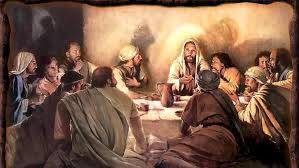 Jesus’ miracle of the loaves and fish, which responded to the physical hunger of the crowd, foreshadowed his miracle at the Last Supper when he shared himself in the Eucharist — the Bread of Life — with his disciples, thereby satisfying their spiritual hunger.
Jesus’ miracle of the loaves and fish, which responded to the physical hunger of the crowd, foreshadowed his miracle at the Last Supper when he shared himself in the Eucharist — the Bread of Life — with his disciples, thereby satisfying their spiritual hunger.
The lesson of the miracle of the loaves and fish is obvious: by portraying Jesus as doing what God did for the Israelites in the desert, by giving them manna, the evangelist is forging an identity between Jesus and God. Jesus, who responded to and reached out to people in their need, wants his followers to do the same. The question for all of us is: In what ways do we share ourselves, our gifts and our time with other people when they are needy? In other words, what are we prepared to do to help people avoid sin and facilitate the salvation of their souls? We are challenged to appreciate one another just as Jesus appreciated the crowd that had gathered to listen to him.
It can be extremely difficult to put other people’s needs before our own. However, that is what we are called to do as Christian disciples. In the miracle of the loaves and fish, Jesus relied on his Father’s help as he responded to a crisis. Likewise, we, Jesus’ disciples, need to rely on his help as we respond to crises and needs.
Can we, by our convictions and lifestyles, satisfy the hunger in other people’s lives? In the same spirit, can we desist from asking other people to do what we are unwilling to do ourselves? Let us, therefore, give generously and receive graciously, always imitating the generosity of our Lord and Saviour Jesus Christ.
For meditation
They all ate as much as they wanted,
and they collected the scraps remaining,
twelve baskets full. (Mt 14:20)
*************************************************
Donal Neary SJ
Gospel Reflections
www.messenger.ie/bookshop/
Feeding the needy Pope Francis remarks:
We find Jesus’ wounds in carrying out works of mercy caring for the body of your wounded brother, because he is hungry because he is thirsty because he is naked, because he is humiliated, because he is a slave, because he is in jail, because he is in the hospital. Those are the wounds of Jesus today. And Jesus asks us to take a leap of faith, towards him, but through his wounds in his people today We need to touch the wounds of Jesus, we must caress the wounds of Jesus, we need to bind the wounds of Jesus with tenderness, and we have to kiss the wounds of Jesus, and this literally. Just think of what happened to St Francis, when he embraced the leper. (May 2016)
This is what is behind Jesus’ wish to feed the hungry. He feeds bread for physical hunger, but the story of the gospel today is more than bread for hungry people. It is getting fully involved in the lives of those in need. It is the calling of the church: to practise the works of mercy.
Any Christian group, parish or otherwise, tries to reach out to those most in need in their area. Today the hungry need to be fed, refugees and homeless need a home, and those wounded by life need healing. The call of the church is truly to be ‘the field hospital’ of Jesus and his disciples in the world.
Think of someone really poor;
see Jesus beside him or her.
Pray as you feel drawn.
Give us today, O Lord, and to all our world, our daily bread.
*******************************